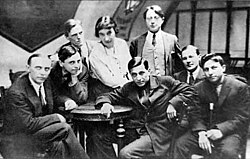Elizaveta Polonskaya
| Elizaveta Polonskaya | |
|---|---|

Serapion brothers, Polonskaya is in the middle of the picture (fourth from the left)
|
|
| Born | Elizaveta Grigorevna Movshenson June 26, 1890 Warsaw, Congress Poland |
| Died | January 11, 1969 (aged 78) Russia |
| Occupation | Poet, journalist |
| Language | Russian |
| Nationality | Russian |
| Ethnicity | Jewish Russian |
| Alma mater | Sorbonne |
| Partner | Lev Davidovich Polonsky |
| Children | Mikhail |
Elizaveta Grigorevna Polonskaya (Russian: Елизаве́та Григо́рьевна Поло́нская; IPA: [jɪlʲɪzɐˈvʲɛtə pɐˈlonskəjə]), born Movshenson (Russian: Мовшенсо́н; June 26 [O.S. June 14] 1890 – January 11, 1969), was a Russian Jewish poet, translator, and journalist, the only female member of the Serapion Brothers.
Elizaveta (Liza) Movshenson was born in Warsaw (in Congress Poland, part of the Russian Empire); her father, Grigory Lvovich Movshenson, was an engineer who had graduated with high honors from the Riga Polytechnical Institute and her mother, Charlotta Ilinichna (née Meylakh), came from a large Jewish merchant family in Białystok. Her family's first language was Russian, but Liza was also taught French, German, Italian, and English. Because of her father's status, he was granted the right to live outside the Pale of Settlement, and the family moved quite often. Just after Liza's birth, they moved to Łódź, where she spent most of her childhood. Movshenson was formally educated at the women's gymnasium where she became interested in politics. Movshenson joined (with the help of her mother) secret groups studying Belinsky and political economy. However, she also studied Judaism with a rabbi, and "not only the stories themselves but also the biblical language (albeit in Russian translation) made a deep impression on her; her solemn, rhetorical verse is often marked by Slavonicisms."
Worried by the 1905 pogroms, her father sent Liza, her mother, and her brother Alexander to Berlin, where Charlotta's sister Fanny lived; there Liza joined another young people's study group, where she first read Marx. The following year the family moved to St. Petersburg, where she began to work for the Bolshevik cell in the Semyannikov section of the Nevskaya Zastava district, occasionally being sent to Finland to pick up leaflets from Vladimir Lenin to distribute in St. Petersburg. In 1908, in order to avoid arrest and to further her education, she went to Paris, where she enrolled in the medical school of the Sorbonne. She attended meetings of the Russian Social Democratic Labor Party, where she met young people who shared her love of poetry and introduced her to the Russian symbolist poets, who made a deep impression on her. In 1909 these friends introduced her to Ilya Ehrenburg, a meeting that was significant for both of them. For a time they were inseparable, and it was she who introduced Ehrenburg to modern poetry and inspired his first verses, as he describes in his memoirs. Leslie Dorfman Davis writes: "Aside from poetry, Erenburg and Movšenson shared a satirical impulse which provoked disapproval from some of their older comrades. [...] Movšenson and Erenburg [jointly] published two journals, Byvšie ljudi (Former People) and Tixoe semejstvo (A Quiet Family), in which they 'rather caustically, without any sort of reverence, mocked the manners of the Bolshevik circle, insulting even the 'chiefs' (Plexanov, Lenin, Trotskij), and therefore had a sensational response.' [...] Although they quarreled and Erenburg fell in love with another woman, Ekaterina Schmidt, he and Movšenson remained friends and corresponded until his death." While in Paris, Liza became acquainted with both Russian and French writers and drifted away from her affiliation with the Bolsheviks; unlike other members of the émigré community (but like Ehrenburg), she was fluent in French and immersed in the intellectual and artistic life of the city. It was also in Paris that she published her first poems.
...
Wikipedia
